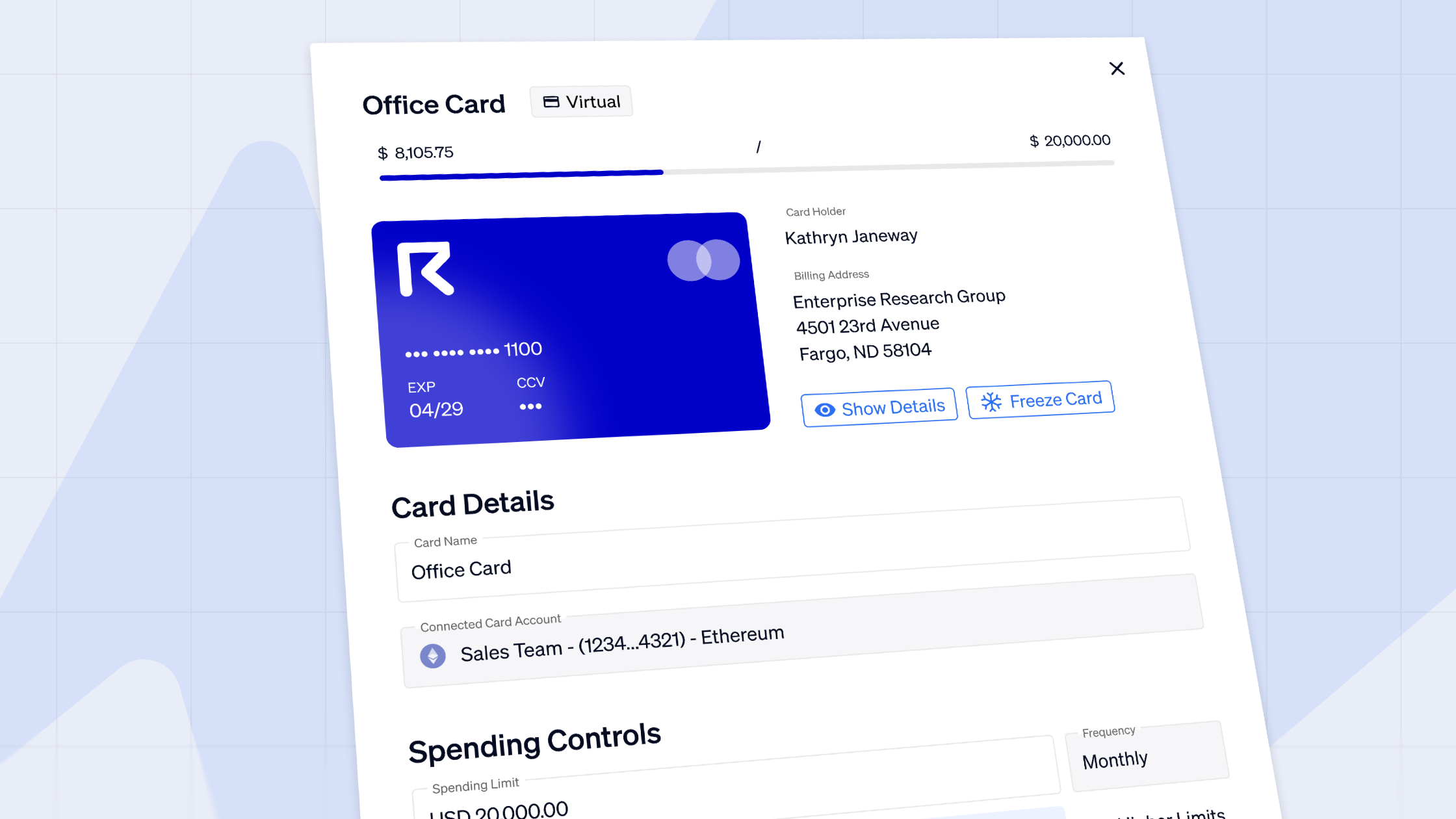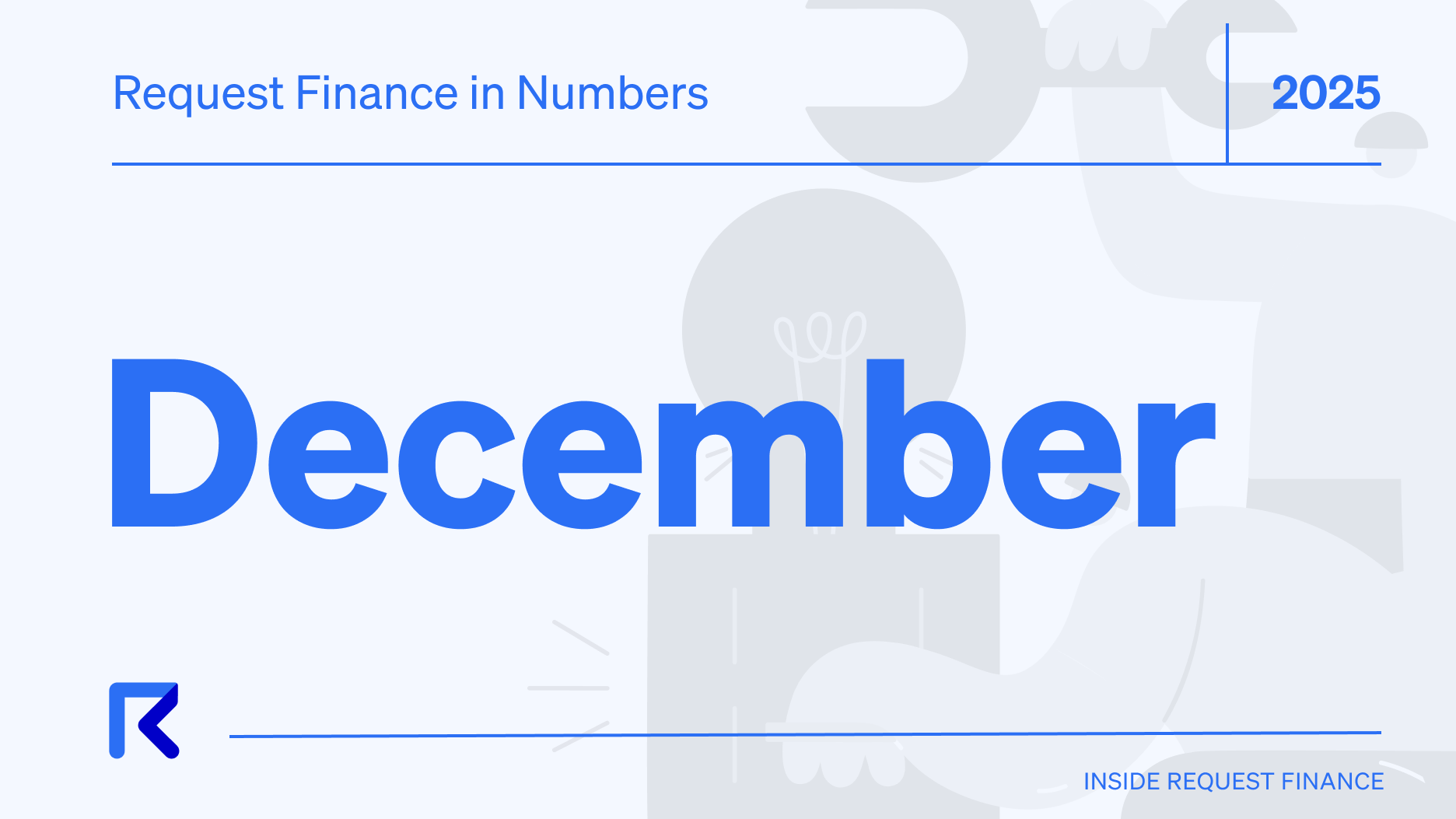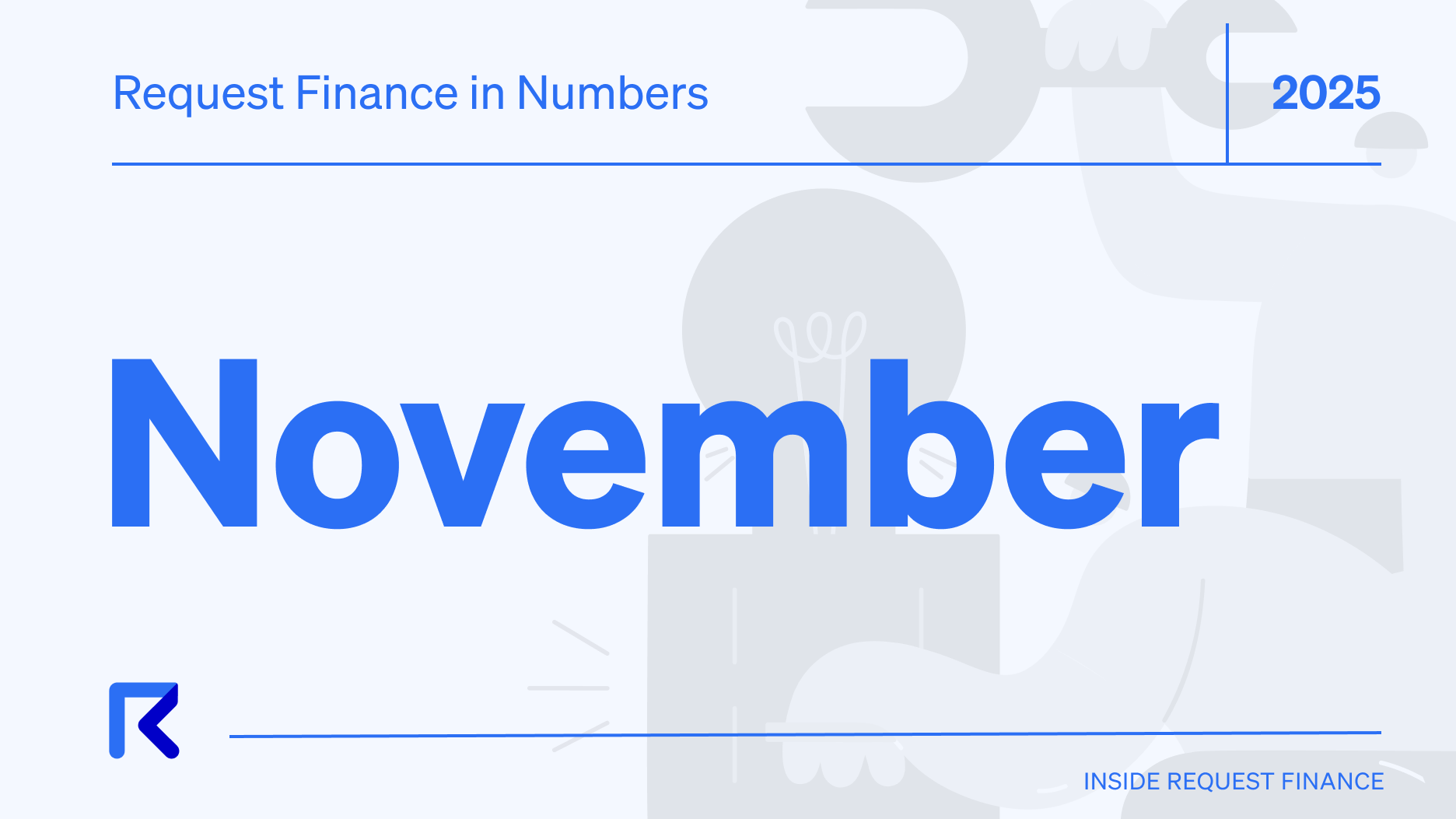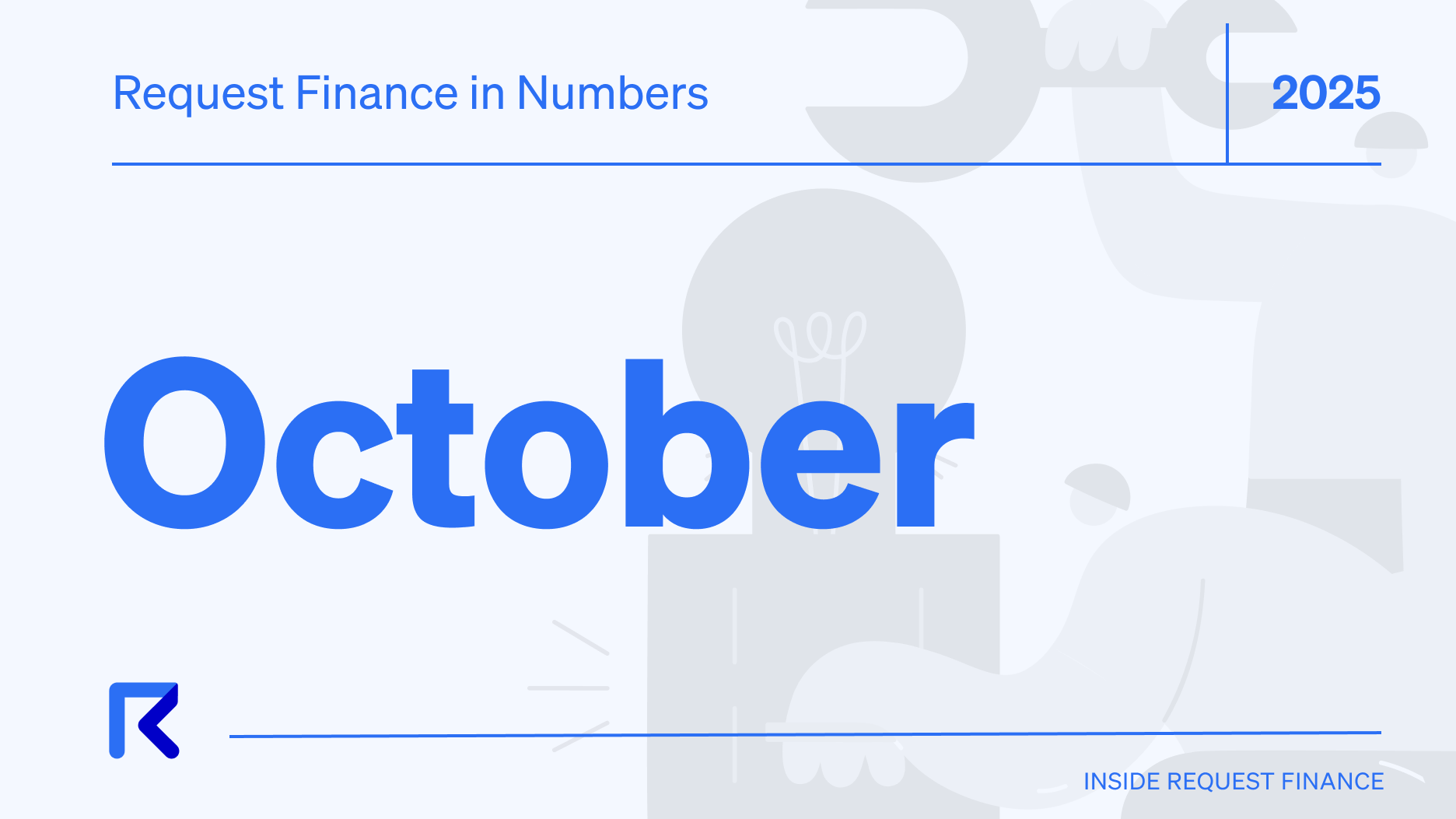Automating Crypto Payments and Invoicing for Web3, DeFi, DAOs, Play to Earn, and NFT projects
Since launching in 2021, over 1,400 web3 companies and freelancers now use Request Finance to automate their crypto payments, and invoicing workstreams. Here’s how.

The Rise of B2B Crypto Payments
Web3 companies are driving the use of B2B crypto payments, not only because counterparts in the web3 economy prefer to pay in their own native tokens. Crypto payments, particularly in stablecoins have proven to be both a faster, and cheaper way to manage B2B payments, especially across countries.
The World Bank estimates the average transaction fee for cross-border payments to be around 6.51% as of Q4 2020, with bank transfers averaging a whopping 11%. Yet in October 2018, a $183 million transaction that would have cost senders over $5 million in commissions on legacy systems like PayPal, was made with just $0.06 on Ethereum.
An average international payment takes 2-3 days to clear. In contrast, Bitcoin takes an average of 10 minutes to process a new transaction, while Ethereum requires an average of 14 seconds as of today. Newer blockchain payment rails like Arbitrum promise to slash transaction costs and settlement times even further.
Apart from crypto being a cheaper, faster means of making cross-border payments, businesses also hold crypto assets on their balance sheet for treasury management purposes. Not only does this apply to volatile cryptocurrencies like BTC or ETH, but also stablecoins which can generate significantly higher yields by being lent out on DeFi platforms, instead of being held in traditional bank accounts.
Whether you are managing a play-to-earn crypto gaming guild, launching an NFT project, or overseeing the financial operations of a DAO, B2B crypto payments are likely a core part of your financial operations.
But for many finance managers or CFOs at web3 companies, that’s where the problems begin.
Ready to Supercharge Your Crypto Accounting?
Stop wasting time, manually creating journal entries. Automate your accounting now, and enjoy error-free reporting
Learn how to scale your company's crypto & fiat financial operations
Your financial complexities are our specialties. Schedule your free consultation today and discover how Request Finance can transform your financial operations
Simplify crypto and fiat financial operations today
Rely on a secure, hassle-free process to manage your crypto invoices, expenses, payroll & accounting.
The Pains of Processing Crypto Payments
Invoices are essential in B2B crypto payments, to append metadata to financial transactions. Whether for tax and audit purposes, or simply for companies to analyze patterns in their finances, invoices are key.
Web3 companies must rely on invoices to pay for many of their major costs in crypto. This ranges from contracting marketing agencies, to paying the salaries of a global team of remote workers like developers, content creators, and community managers.
But keeping records of PDF invoices, and paying invoices in crypto is slow and laborious. A significant amount of time is spent on manual data entry and reconciliation. Crypto finance professionals know the pain of copy-pasting individual wallet addresses, and then sending transaction IDs as proof of payment to each counterparty.
“Paying users with direct wallet transfers made it difficult to track who received how much and for what services”, explains Robin Lehmann, co-founder & CEO of DataUnion. “Also the laborious and painstaking process of managing payments meant it was always difficult to remunerate the team in a timely manner”, he added.
The difficulty of bookkeeping with crypto is real. Accountants and CFOs working with crypto-native companies know the hassle of reconciling B2B crypto payments from invoices.
Invoices in crypto tend to be sent via PDF files, in different layouts and formats which have to be meticulously stored and organized. That makes it difficult, and time-consuming for non-crypto native accountants to reconcile - Rudy Kadoch, founder of the crypto social trading platform, Nested Finance.
To address these challenges, a growing number of web3 companies have turned to Request Finance as a payment solution for NFT projects, DeFi platforms, DAOs, play-to-earn blockchain games to automate their B2B crypto payments.
Automating Crypto Payments and Invoicing with Request Finance
Since launching in 2021, over 2,000 web3 companies now use Request Finance to automate their B2B crypto payments, and invoicing workstreams. Here’s how:
1. Pre-filled invoice templates
Request Finance automatically populates crypto invoices with counterparties’ information, and wallet addresses when receiving or sending an invoice requesting payment in crypto. This eliminates the hassle of having to ask for payment information, or pull data from invoices in different formats when bookkeeping.

Pre-filled invoices also minimize human error and fraud. Wallet addresses are often a string of hexadecimals, making B2B crypto payments particularly prone to costly typos, and more commonly, fraud.
When making crypto payments, users must copy a string of 26 to 35 characters which serves as the recipient’s wallet address. Most wallets make sure that this alphanumeric string matches the public key of a cryptocurrency wallet that actually exists. Sending payments to non-existent addresses due to a typo is rare.
Far more common, however, is sending crypto payments to the wrong wallet address. A user might, for instance, pay to an address belonging to a fraudulent actor spoofing a known counterparty rather than the correct wallet address on an outstanding invoice.
Unlike bank accounts or mobile fiat wallets which show recipient names prior to making payment, it is frightfully easy to mix up the numerous crypto wallet addresses, which can be wrongly labeled on an Excel spreadsheet.

“A combination of Metamask and a spreadsheet is certainly not the most efficient way to keep financial records”, explains Robin Lehmann, co-founder & CEO of DataUnion.
In May 2021, BlockFi accidentally sent some $20 million in Bitcoin as part of a bungled promotional campaign. In October that same year, about $90.1 million mistakenly went out to users of popular DeFi staking protocol, Compound, after an upgrade introduced a bug.
With Request Finance, users connect their wallets to their accounts. This ensures that the payments you make to the counterparty you select in the app will always receive the funds in a wallet address they own.
“Winning teams can use Request to send pre-filled invoices with the correct payment information linked to their email accounts. This helps us prevent administrative errors, and save time from not having to retrieve and key in the right payment details” explained Frederic Meyer-Scharenberg, organizer of the Swiss Blockchain Hackathon 2021.
2. Schedule recurring invoices
Recurring payments are common to a number of contractual relationships for businesses. This includes items such as salary payments to team members, or subscription fees to be collected from software users.
With just a simple checkbox, users can schedule the automated sending of recurring invoices in Request Finance.

This frees up time your finance team spends on collections. For instance, when you onboard a subscriber for your SaaS platform, you can schedule a recurring invoice for the subscription fee to be sent to the subscriber every month, on the anniversary of the subscription contract.
Request Finance is also in the process of integrating streaming payments with Superfluid, which will open up new pay-as-you-go, or “PAYG” revenue models for your business.
3. Pay multiple crypto invoices at once
Say goodbye to paying individual invoices one-by-one. With Request Finance, you can pay multiple invoices, and up to hundreds of different wallet addresses within just a few clicks. This saves a tremendous amount of time, as well as transaction fees.
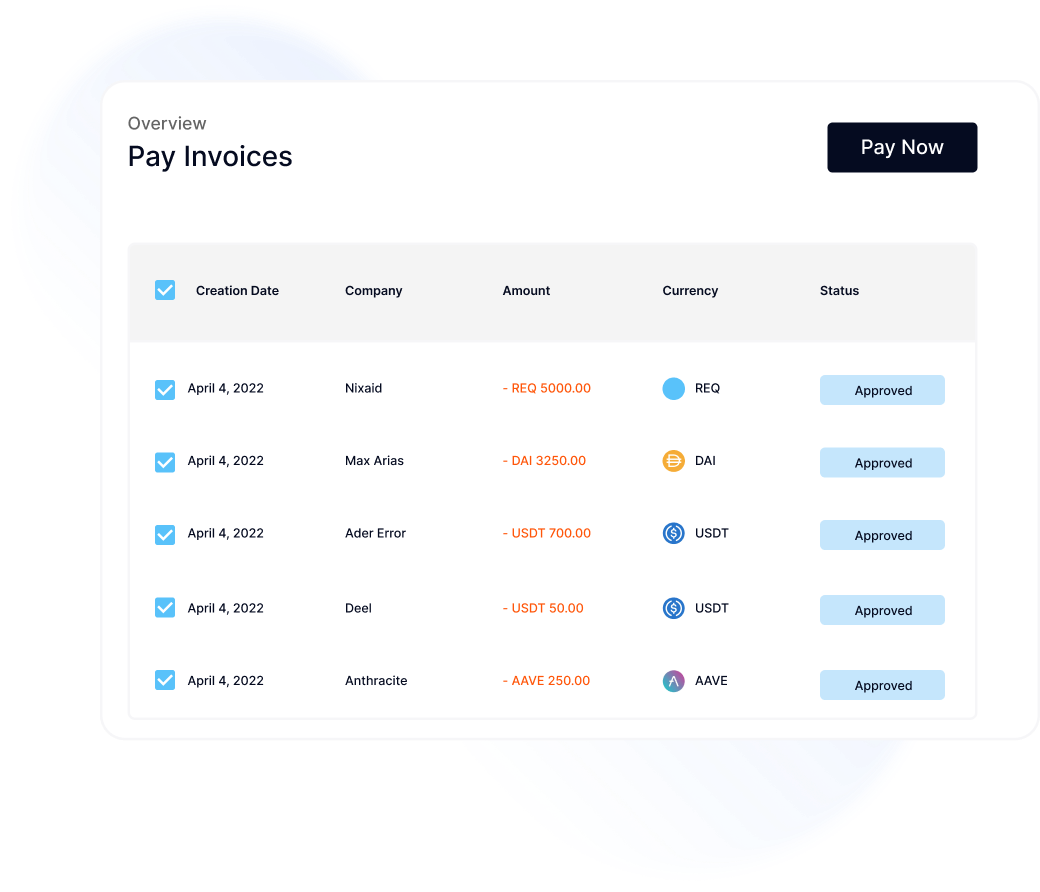
4. Real-time payment status updates
Ensuring that you pay your bills on time, while also keeping tabs on the outstanding payments due to you is critical to your business’ reputation, and cashflow. With Request Finance, businesses can view all their invoice statuses in real time - all from a single dashboard.
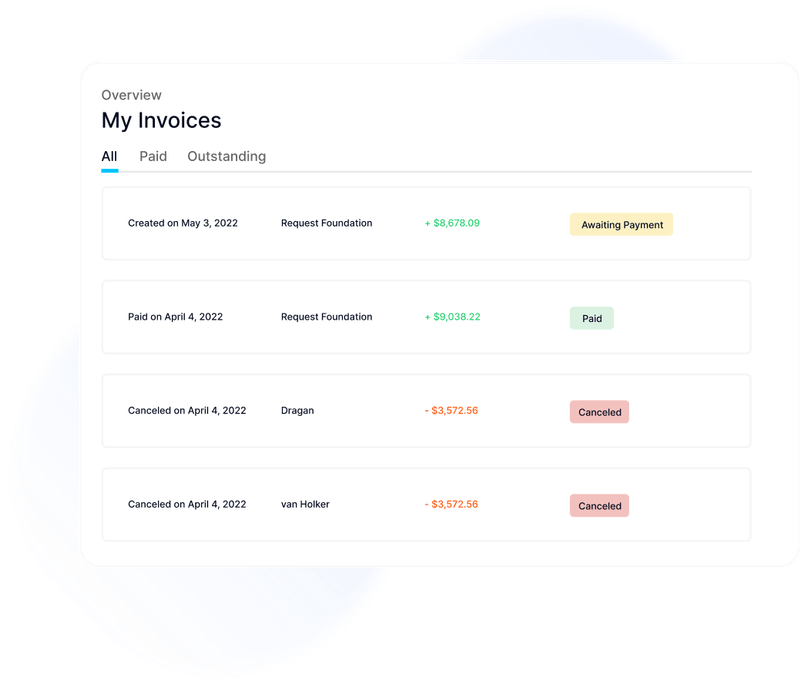
The ability to review outstanding invoices not only lets you keep tabs on your accounts. It also automatically provides your counterparties with real-time payment confirmations with on-chain data.
No longer do you need to send, or request transaction IDs as proof of payment, or check blockchain explorers. You’ll know exactly when the funds hit your wallet.
To learn more about how you can optimize your financial operations in crypto, see how Request Finance is the payment solution for NFT projects, DeFi platforms, DAOs, play-to-earn blockchain games like The Sandbox, AAVE, and MakerDAO.
Interested? Book a demo with your finance team today.
Crypto finance tips straight to your inbox
We'll email you once a week with quality resources to help you manage crypto and fiat operations
Trending articles
Get up to date with the most read publications of the month.
Our latest articles
News, guides, tips and more content to help you handle your crypto finances.




